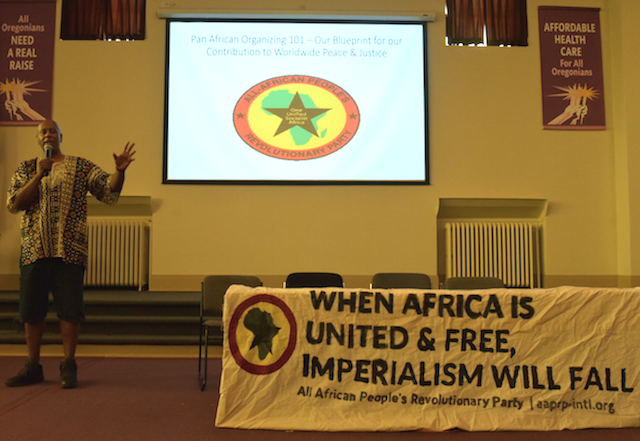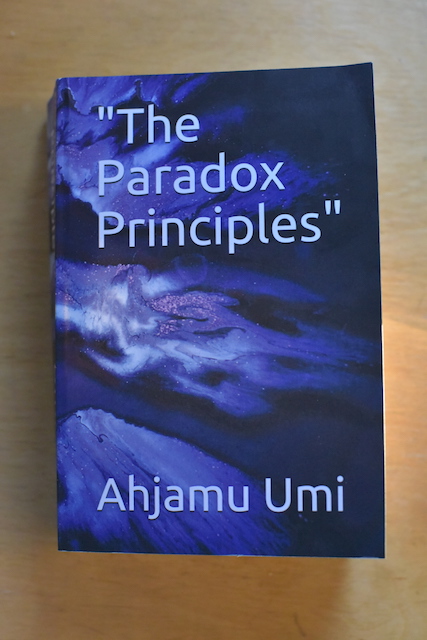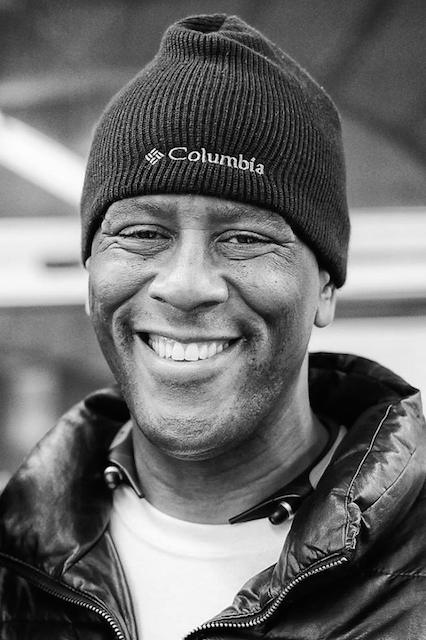
Story by Pete Shaw
Power and control of narrative are deeply intertwined. The United States, the narrative goes, does not invade countries, but rather seeks to spread the blessings of freedom, liberty, and democracy. We know this to be true because the purveyors of our capitalist imperial violence have said so. Those who die and suffer under the yoke of these blessings, particularly if they are resisting, are usually deemed terrorists. At the heart of any system and movement lies propaganda.
Ultimately, the question is who gets to define who we are, and one of the most important aspects of any movement for greater justice is offering people a definition of who they are that contrasts with the dominant narrative. It is a question–and a challenge–that lies at the heart of Ahjamu Umi’s new book The Paradox Principles, the sequel to his fine The Courage Equation which Umi published in 2014.
Umi, who is a Friend of mine, is an organizer with the All-African People’s Revolutionary Party (A-APRP) which is dedicated to promoting one unified socialist Africa for Africans. Much like its predecessor, The Paradox Principles functions largely as a propaganda treatise for the A-APRP’s politics, values, and goals. It is an action thriller novel, with a touch of mystery thrown in for good measure. Umi has spent his adult life organizing for greater justice, particularly with the A-APRP, and within the pages of The Paradox Principles lies an abundance of important and useful information and ruminations that other folks involved in organizing for greater justice would do well to consider.
The story jumps off only a few hours after the end of The Courage Equation, with Boahinmaa Omawale–the former Ashley Summers, a white Oregonian who is a member of the A-APRP–lying in a hospital bed in Atentrenee Sukuu, the A-APRP school and compound in Accra, Ghana. She is recovering from injuries suffered when her husband, Adisa, was killed as the vehicle he was entering exploded at the end of that book. With a child on the way, Boahinmaa must grieve, prepare for birth, figure out who killed her beloved Adisa, and ultimately define herself. As she wrestles with these challenges, she must also grapple with her role in the A-APRP, particularly as a white person who has been accepted by some quarters of the A-APRP, although certainly not unanimously, as an African. Her definition, as it is, is inextricable from her organization.
It turns out that Adisa was murdered at the behest of the US government because student demonstrations that he helped organize against Cargill were costing the company millions of dollars. Upon finding this out in a file stolen from an undercover US intelligence operative posing as a church man, Boahinmaa thinks, “So there it is. They killed my Adisa because they felt it was a smart thing to do strategically. A simple chess move.”

After mourning her husband, Boahinmaa goes on a speaking tour of the United States to help grow the A-APRP, as well as to alert people to the crimes of the US government, both in killing her husband as well as violently repressing movements that challenge capitalism and US imperialism. The tour is punctuated by testimony in front of the Congressional Black Caucus Committee and family visits. Along with her goes Bridget, an African woman who takes umbrage with a white European like Boahinmaa having such a pronounced role in the A-APRP. Bridget is as committed to the A-APRP as Boahnimaa and respects the work she has done. But she finds it problematic that a blonde haired, blue eyed person could be considered African, much less be entrusted with being one of the prominent faces of the A-APRP, the face of those who for centuries have exploited the continent and its people.
In and of itself, this angle poses an interesting debate around the question of what it means to be African. Is it defined by physical traits, or those that lie below the surface, emerging in our politics?
When Boahinmaa and Bridget are arrested on charges of conspiracy to commit terrorism, they are forced to reckon with the more immediate issue of their survival. Seemingly clear lines become vague. The two must reckon with once firmly held beliefs and assumptions, both in terms of their relationship to each other, and the mission of the A-APRP. Through a harrowing narrative arc, the pair finally achieve a greater understanding of themselves and their roles in the A-APRP.
While Boahinmaa and Bridget, and their adventures, for lack of a better term, are not the primary focus of the book, they are the strand that pulls together the political elements of Umi’s work. Through them, as well as the numerous other characters met along the way, Umi presents a diverse world of organization and solidarity. When in prison–a nearly all male one–Boahinmaa and Bridget are in a cell on the second floor, surrounded by white supremacists. One floor below, the inmates are all Africans. While they cannot protect Boahinmaa and Bridget all the time, they are well enough organized that they can keep a watchful eye for a good amount of the day.
When they escape their bondage, they are continually aided by allies of all kinds. Organization, as well as solidarity, gets the goods.
And as we know from The Courage Equation, Boahinmaa is also quite capable of taking care of herself. She may be riddled with self-doubt, but when the time comes for action, she is ready. While not seeking to take life, she understands that she has every right to defend herself, her child, and for that matter, all people who would stand against the forces that would continue ravaging Africa and its people for the sake of greater profit. Education and organization are vitally important, and in some situations, when your back is against the wall, so is an AR-15. Time and again Boahinmaa finds within herself reserves of strength, love, and compassion–expressed at some moments with great sensuality, and at others with equally intense ferocity–that she did not know existed.
Whereas in The Courage Equation Umi’s political statements often showed through almost too strongly in comparison with his characters and story, in The Paradox Principles Umi achieves a greater balance. Here his characters are more fully drawn. While not quite character studies, they do have greater depth and detail than in his prior work. We better understand their motivations, and consequently we care more about them. As a result, their politics in all their intricacies come through more naturally than in The Courage Equation.
That is also a result of Umi making better use of his narrative to get across his politics and the politics of the A-APRP. Here, they come across more naturally, such as during the funeral oration for Adisa, when Boahinmaa’s close confidant–her nuabaa–Adwoa addresses the large crowd that has gathered to bid Adisa farewell. Describing the A-APRP’s work at Atentrenee Sukuu, she states, “…we provide a socialist model for people to identify with. We express, to the people, the need to get organized, in order to take Africa back from the international corporate thieves who keep Africa dependent upon them.” The sentiment is later further fleshed out when Boahinmaa testifies in front of the Congressional Black Caucus. After providing a few examples of corporate exploitation of Africa’s resources, a representative asks, “But isn’t it true that without the science and expertise of these corporations there would be no ability to develop those resources in those countries?”

Under a capitalist ethos it seems a fair question, perhaps even magnanimous. But not for Boahinmaa, who replies, “That’s like saying your starving neighbor has fertile soil, but has no resources, training, or ability to develop the soil. You have benefitted from his soil, but instead of using that benefit to help him/her develop their capacity to develop the soil for their salvation, you decide to just appropriate their lands and use them to further your profits while preventing them from having any say of self-determination in the process.”
It is a statement that does not come across as didactic because Umi has so skillfully rendered his cast and his story in such a way that they feel natural to a character like Boahinmaa. It is a testament to Umi’s skill as a writer–and his clear commitment to challenging himself on the page–that so many of these statements that might have seemed forced instead come across as seamless.
It is this commitment that makes the two weaknesses of this book–small, perhaps pedantic complaints–feel that much more frustrating. The first is copyediting. There are numerous errors of spelling, grammar, and punctuation. These hardly rise even to the level of minor sins, but they do disrupt what is an otherwise well-constructed, well-paced, and enjoyable read. They time and again confound how well Umi controls the dynamics of his story: the meditative portions meditate, while the action pieces crackle. To have that disturbed–admittedly for only a split second as these errors do not affect the clarity of what Umi writes–is akin to listening to a great concert where every so often the singer drops a note or an instrumentalist hits a wrong one. The entire performance merits praise, but occasionally it will nag at the base of your skull that it could easily have been even better because it deserved better.
The other weakness is a particular instance of overstatement. In a book that respects both its readers’ knowledge and their desire to gain more of it, during Boahinmaa’s and Bridget’s escape from prison, they and their various comrades are clearly reenacting their own version of the Underground Railroad, including a literal ride on a train. The allusion is clear even as they pursue a different North Star, this one over Africa. If I could change one thing about The Paradox Principles’ story, it would be when one of the characters unnecessarily states that what they are doing is just like the Underground Railroad.
As an organizer, Umi has often commented with great humility that he sees himself as a link in the chain toward greater justice, and it is difficult not to read some of the last words of this book as that guiding thought. It seems so simple to be “someone who tried to grow and make a difference” and whose legacy will be that their “example can continue to inspire people.” But anyone who has tried knows its difficulty, if only because that challenge so often seems insurmountable. Despair may not be an option, but often it is lurking over our shoulders. Resistance, the propaganda of the powerful has it, is futile. To continue fighting against such odds, however small one’s steps, is nothing short of a triumph.
With The Paradox Principles Umi has crafted a novel that is in every way stronger than its predecessor. That too is never a small achievement.
Purchase The Paradox Principles at: https://www.amazon.com/Paradox-Principles-Ahjamu-Umi/dp/1092205292/ref=sr_1_1?keywords=the+paradox+principles&qid=1557240041&s=gateway&sr=8-1
For more information on the All-African People’s Revolutionary Party, go to: https://www.facebook.com/AAPRP/






